イベント&アクティビティ
Joint DIJ and DWIH workshop on interconnections of sustainability
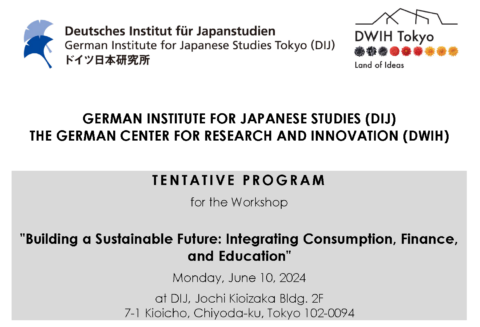 The workshop “Building a Sustainable Future: Integrating Consumption, Finance, and Education” delves into the interconnected issues of sustainability, sustainable consumption, sustainable finance and education. Collectively, they form a holistic approach to creating a more balanced and resilient world. Sustainable consumption encourages mindful choices to minimize waste and environmental impact, while sustainable finance directs capital toward environmentally friendly and socially responsible investments. Together, they create a powerful framework that fosters innovation, promotes responsible resource management, and drives positive social and environmental outcomes, paving the way for a sustainable and prosperous future. This one-day in-person workshop, jointly organized by the DIJ and the German Center for Research and Innovation (DWIH) Tokyo, brings together eights experts who will share they views and latest research on different aspects of sustainability. Details and registration here
The workshop “Building a Sustainable Future: Integrating Consumption, Finance, and Education” delves into the interconnected issues of sustainability, sustainable consumption, sustainable finance and education. Collectively, they form a holistic approach to creating a more balanced and resilient world. Sustainable consumption encourages mindful choices to minimize waste and environmental impact, while sustainable finance directs capital toward environmentally friendly and socially responsible investments. Together, they create a powerful framework that fosters innovation, promotes responsible resource management, and drives positive social and environmental outcomes, paving the way for a sustainable and prosperous future. This one-day in-person workshop, jointly organized by the DIJ and the German Center for Research and Innovation (DWIH) Tokyo, brings together eights experts who will share they views and latest research on different aspects of sustainability. Details and registration here
Celia Spoden presents research on avatar robots at international symposium in Kyoto
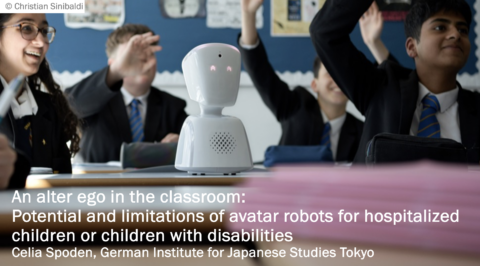 DIJ researcher Celia Spoden will present latest results from her research project Cyber-physical spaces and avatar technologies: new opportunities for an inclusive society? at the International Symposium ‘Participation (Un)plugged: Exploring Dignity and Disability through Human-Robot Interaction’ at Ritsumeikan University in Kyoto on May 19. Her paper “An alter ego in the classroom: Potential and limitations of avatar robots for hospitalized children or children with disabilities” is one of four presentations at the symposium that will explore how the digital space — where people, objects, and information intersect — can reshape notions of ‘personhood’ and ‘dignity’. Participation is possible online and onsite. Details and registration here
DIJ researcher Celia Spoden will present latest results from her research project Cyber-physical spaces and avatar technologies: new opportunities for an inclusive society? at the International Symposium ‘Participation (Un)plugged: Exploring Dignity and Disability through Human-Robot Interaction’ at Ritsumeikan University in Kyoto on May 19. Her paper “An alter ego in the classroom: Potential and limitations of avatar robots for hospitalized children or children with disabilities” is one of four presentations at the symposium that will explore how the digital space — where people, objects, and information intersect — can reshape notions of ‘personhood’ and ‘dignity’. Participation is possible online and onsite. Details and registration here
Hybrid Study Group on Post-Bubble Housing Insecurity in Tokyo

Before the speculative bubble in Japan’s real estate market burst in the early 1990s, real estate prices in Tokyo skyrocketed without wage growth at all levels of society keeping pace. When the crisis hit, the city experienced unprecedented levels of homelessness. In response, labor and housing markets were subjected to neoliberal restructuring. But what created greater housing insecurity in other parts of the world seemed to have the opposite effect in Tokyo – the number of officially recorded rough sleepers dropped significantly. How could this be? Based on a reevaluation of Japanese literature, an analysis of government, industry, and business reports, and backed up by in-depth interviews conducted with both entrepreneurs and residents, this presentation will outline four case studies of fragile housing to examine the regulation of homelessness as an expression of Japanese capitalism in crisis. Details and registration here
Hybrid Study Group on Japanese photography in Manchuria

From 1932 to 1945, professional Japanese photographers, civilians, and soldiers took many pictures in Manchuria and North China. After the official commencement of the war with China in 1937 they began to contribute to the ‘National Reportage Movement’. Japanese authorities employed photographic propaganda to justify the Japanese government’s and Imperial Army’s activities on the continent. However, Japanese soldiers and civilians also used the camera to document and produce memories of their daily lives and experiences in China. This talk aims to bring forward new perspectives on photographic practices and on visually over- or underrepresented aspects of the Japanese occupation of Manchuria and North China. It introduces examples of private photo albums by soldiers stationed in Manchuria and discusses their creation as processes of selecting and ordering images. Drawing on visual anthropology and media history, the presentation will show connections between “imperial” and “patriotic” photography, and between vernacular and formal photographic repertoires. Details and registration here
Online Study Group on Japanese housewives’ post-war anti-pollution movement
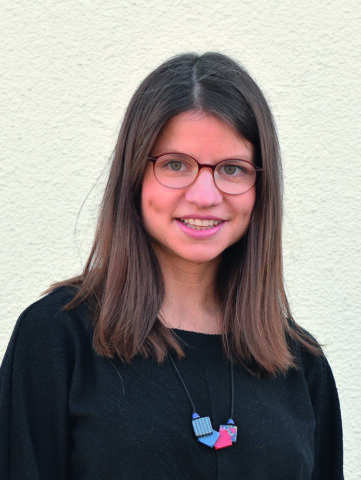
“Give us Our Blue Skies Back!” is the catchphrase under which nearly 7,000 women in Tobata (Kitakyushu) mobilised against emissions from local industries. Most of the activists were ordinary housewives with little formal education and without political experience. Yet, these housewives executed one of the earliest, longest, and most sophisticated anti-pollution movements in Japan’s postwar history, spanning from 1950 to 1969. Engaging in a new way of writing the history of environmental movements, this research shifts the focus from men to women, from highly educated elites to ordinary citizens, from Tokyoites to people in the Japanese periphery, and from the presumed heyday of environmental movements, the 1970s and 1980s, to the 1950s and 1960. It thereby contributes to a new understanding of the democratisation of Japan, gender roles in post-war society, the rise of ecological consciousness and the democratisation of science through ‘citizen scientists’. Details and registration here
DIJ researchers at ‘Popular Cultures of Digitalization’ workshop
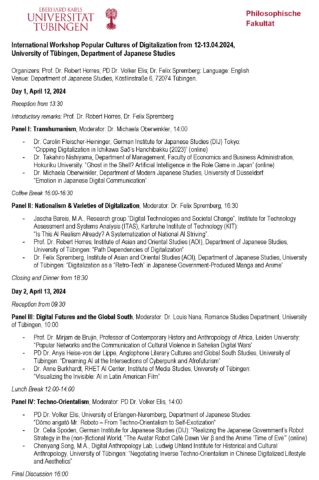 DIJ researchers Carolin Fleischer-Heininger and Celia Spoden will present their latest research results at the international workshop “Popular Cultures of Digitalization” on April 12 and 13. Carolin will present her paper “Cripping digitalization in Ichikawa Saō’s Hanchibakku (2023)” in the first panel on Transhumanism on Friday. On Saturday, Celia will give her paper “Realizing the Japanese Government’s Robot Strategy in the (non-)fictional World: The Avatar Robot Café Dawn Ver.β and the Anime ‘Time of Eve'” in the last panel on Techno-Orientalism. The workshop is organized by DIJ alumni Robert Horres, Volker Elis, and Felix Spremberg at the University of Tübingen’s Department of Japanese Studies.
DIJ researchers Carolin Fleischer-Heininger and Celia Spoden will present their latest research results at the international workshop “Popular Cultures of Digitalization” on April 12 and 13. Carolin will present her paper “Cripping digitalization in Ichikawa Saō’s Hanchibakku (2023)” in the first panel on Transhumanism on Friday. On Saturday, Celia will give her paper “Realizing the Japanese Government’s Robot Strategy in the (non-)fictional World: The Avatar Robot Café Dawn Ver.β and the Anime ‘Time of Eve'” in the last panel on Techno-Orientalism. The workshop is organized by DIJ alumni Robert Horres, Volker Elis, and Felix Spremberg at the University of Tübingen’s Department of Japanese Studies.
Hybrid Study Group on Japanese Environmental Attitudes
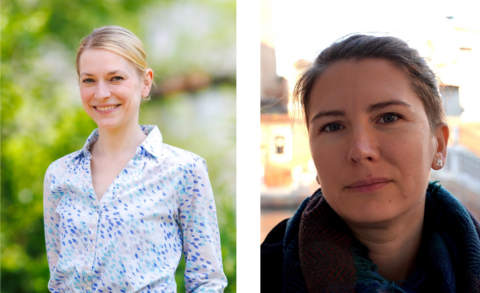
The role of institutional and governmental policies in combating climate change is crucial, yet their success hinges on public compliance and support. The willingness of people to modify their individual habits directly impacts the effectiveness of climate protection measures. Using survey data from the International Social Survey Programme Environment module for Japan between the years 1993 and 2020, this presentation discusses how the perception and reaction to environmental issues and climate change has evolved. The analysis centres on pro-environmental attitudes, willingness to make sacrifices to protect the environment, environmental self-efficacy, and beliefs in external solutions to the climate crisis. The presentation aims to shed light on the intricate relationship between individual attitudes, societal trends, and policy effectiveness in the context of climate change, ultimately providing insights that could guide future strategies for fostering a more environmentally sustainable society in Japan. Details and registration here
Hybrid Study Group on Political Economy of Green Industrial Policies in East Asia
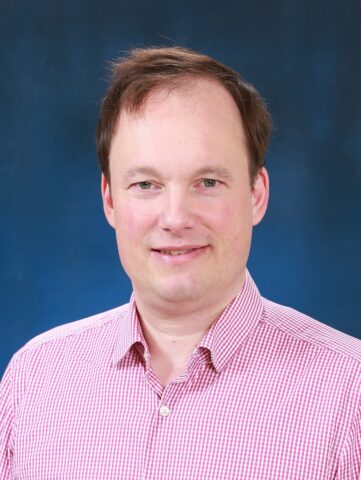 Green industrial policies are at the center of a distinct sustainability transformation process in East Asia, most notably in China, Japan, and South Korea. These East Asian late-capitalist economies differ in many ways but also share strong commonalities that distinguish them from Western capitalist types. The three countries are now taking a leading role in developing green technologies, industries, and exports. In fact, they have been able to occupy crucial parts of the global value chain in green industries and the international political economy of sustainability. This presentation investigates why the three East Asian countries succeeded in green technology leadership but lack behind in achieving other environmental goals. What are the distinct characteristics that distinguish them from Western market economies and what are the lessons that can be drawn for countries in the Global North and the Global South alike? Details and registration here
Green industrial policies are at the center of a distinct sustainability transformation process in East Asia, most notably in China, Japan, and South Korea. These East Asian late-capitalist economies differ in many ways but also share strong commonalities that distinguish them from Western capitalist types. The three countries are now taking a leading role in developing green technologies, industries, and exports. In fact, they have been able to occupy crucial parts of the global value chain in green industries and the international political economy of sustainability. This presentation investigates why the three East Asian countries succeeded in green technology leadership but lack behind in achieving other environmental goals. What are the distinct characteristics that distinguish them from Western market economies and what are the lessons that can be drawn for countries in the Global North and the Global South alike? Details and registration here





 Open Access
Open Access
